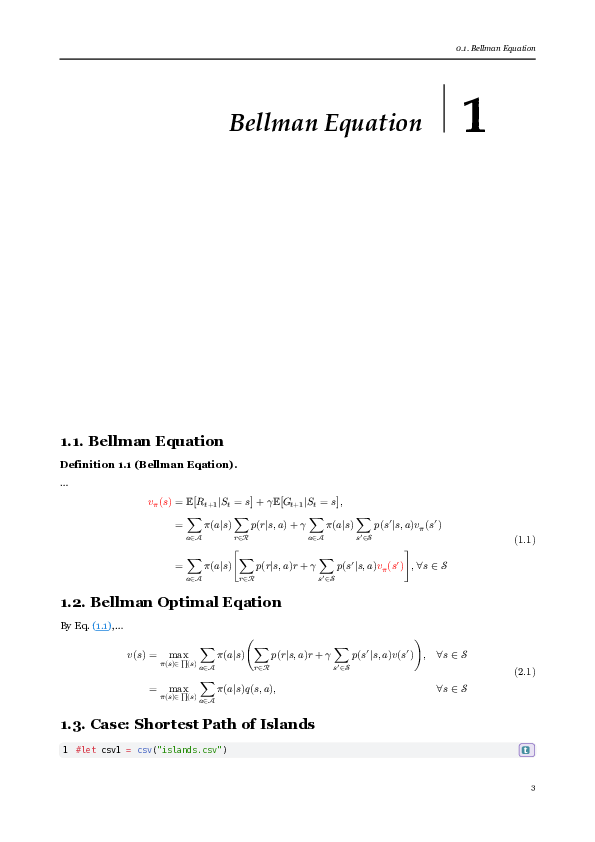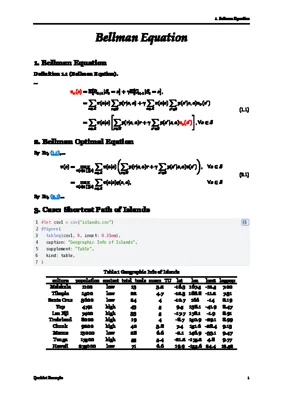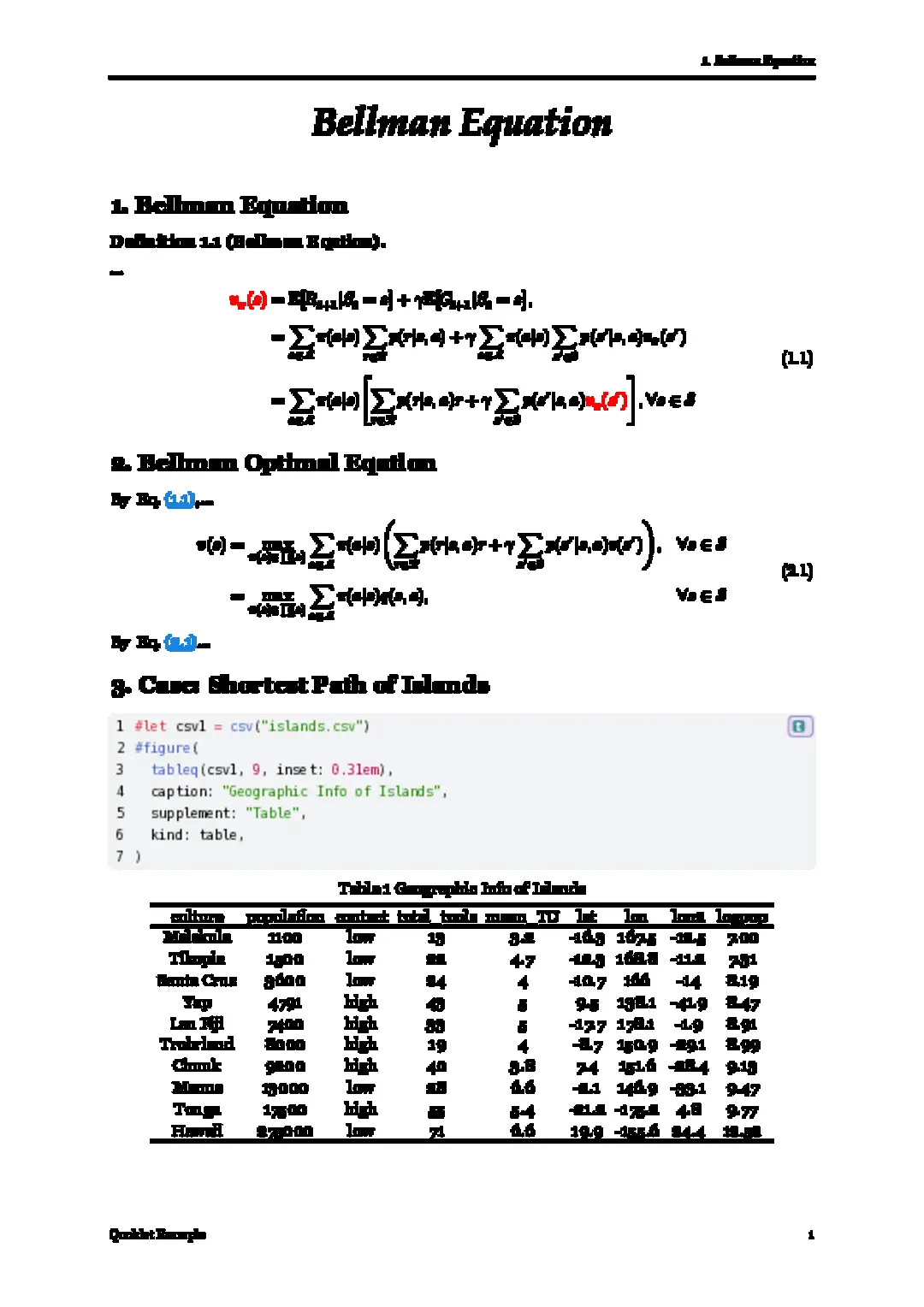A quick start template for scientific booklets.
Features
Modularization
- Mode Switch
- the default mode is note mode
- when
cover()is called the booklet mode will be activated
- Styles
- call
cover(),epigraph(),preface(),contents()andpart-page()to generate corresponding page - call
chapter-style()andappendix-style()to change to customized layout
- call
Automation
- Math Equation
- auto numbering based on chapter
- link quote to source
- Figure
- auto numbering based on chapter
- Table
- read as three-line table
- Code Block
- stylized by (using codly)
- read code block
Useful Functions
Tables
tableq(data, k, stroke: table-three-line(rgb("000")), inset: 0.3em): reading .csv, wherekis the number of columns, and for stroke,qookletprovide 2 predefined stylestable-three-line(stroke-color): default style, for three-line tabletable-no-left-right(stroke-color): for grid without left border and right border
#let data = csv("data.csv")
#figure(
tableq(data, 5),
// stroke: table-three-line(rgb("000")),
// caption: ""
// supplement: "",
kind: table,
)
Codes
code(text, lang: "python", breakable: true, width: 100%): read stylized code blocks
#let compose = read("docker-compose.yml")
#code(compose, lang: "yaml")
Environments
- Theorem
- theorems enviroment is implemented by using theorion (the counters still needs tweaking in the booklet mode)
- Shorthands
- scientific shorthands are provided by physica
Get Started
Import qooklet from the @preview namespace.
Note Mode
#import "@preview/qooklet:0.6.1": *
#show: chapter-style.with(
title: "Chapter Title",
// the following are optional arguments
// title: "",
// info: default-info,
// styles: default-styles,
// names: default-names,
// outline-on: false,
)
where info is an argument that let you customize the information of your booklet using a toml file (if you leave it alone, the following info will be empty).
You can read you info file by the following sentence
#let info = toml("your path").key-you-like
The toml file should look like this
[key-you-like]
title = "Your Booklet Name"
author = "Your Name"
footer = "Some Info You Want to Show"
header = "Some Info You Want to Show"
lang = "en" # or "zh"

Booklet Mode
The booklet mode will be activated after calling cover()
#import "@preview/qooklet:0.6.1": *
#let info = toml(your-info-file-path).key-you-like
// for example: #let info = toml("config/info.toml").global
// add a cover
#cover(
info,
date: datetime.today(),
)
#epigraph(info: info)[
// Add an epigraph to the document.
]
#preface(info: info)[
// Add a preface to the document.
]
#contents
// body
#show: chapter-style.with(
title: "chapter-title 1",
info: info,
)
#show: chapter-style.with(
title: "chapter-title 2",
info: info,
)
...
// appendix
#part-page(info: info)[Appendix]
#show: appendix-style.with(
title: "Appendix-title 1",
info: info,
)
#show: appendix-style.with(
title: "Appendix-title 2",
info: info,
)
...

Tweaking the Params
Names
Qooklet’s section names support English and Chinese by default. If you are not neither English speaker nor Chinese speaker, assume you are a French speaker, you can create a toml like
[sections.fr]
preface = "Préface"
chapter = "Chapitre"
content = "Table Des Matières"
bibliography = "Bibliographie"
[blocks.fr]
algorithm = "Algorithme"
table = "Tableau"
figure = "Figure"
equation = " Eq."
rule = "Règle"
law = "Loi"
after reading this file by toml(), assign its value to the argument names in style functions, such as chapter-style(), appendix-style().
Styles
If you are not satisfied with the default styles such as font-family, font-size, you can create a toml like
[paper]
note = "a4"
booklet = "iso-b5"
[spaces]
par-indent = 2
par-leading = 1
par-spacing = 1
list-indent = 1.2
block-above = 1
block-below = 1
contents-indent = 1.2
[sizes]
chapter = 24
chapter-index = 50
cover = 36
author = 24
date = 18
epigraph = 16
preface = 22
contents = 22
part = 36
heading-1 = 16
heading-2 = 14
heading-3 = 12
heading-4 = 10.5
context = 10.5
header = 8
footer = 8
[fonts.en]
chapter = "Palatino"
chapter-index = "Palatino"
cover = "Palatino"
author = "Times New Roman"
date = "Times New Roman"
epigraph = "Georgia"
preface = "Georgia"
contents = "Georgia"
part = "Georgia"
context = "Georgia"
math = "Times New Roman"
after reading this file by toml(), assign its value to the argument in style functions, such as chapter-style(), appendix-style().
Don’t forget to change the key lang in your info toml metioned above.
For more details, see examples.typ and examples-book.typ.
Clone the Repository
Clone the qooklet repository to your @local workspace:
- Linux:
$XDG_DATA_HOME/typst/packages/local~/.local/share/typst/packages/local
- macOS:
~/Library/Application\ Support/typst/packages/local - Windows:
%APPDATA%/typst/packages/local
Import qooklet in the document
#import "@local/qooklet:0.1.0": *
For developement convinience, local repo never changes the version
Credits
Thanks @ParaN3xus for his haobook which offers much inspiration of the rewriting of this template.
Also thanks the creators of the following packages
- @tingerrr: hydra
- @Leedehai: physica
- @Dherse: codly
- @swaits: codly-languages
- @OrangeX4: theorion

